Fleurs du Mal Magazine


Or see the index
Van onzen correspondent bevat de artikelen die Willem Elsschot in de jaren 1918-1922 schreef voor de Nieuwe Rotterdamsche Courant. Ze zijn bijeengezocht en van een geschiedenis voorzien door C.J. Aarts en M.C. van Etten.
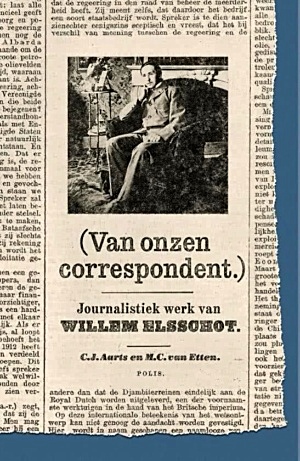 Bijna niemand weet dat Willem Elsschot kort na de Eerste Wereldoorlog een paar jaar de Antwerpse correspondent van de Nieuwe Rotterdamsche Courant was. Elsschot brengt nuchter verslag uit, maar laat zijn sarcastisch commentaar niet achterwege.
Bijna niemand weet dat Willem Elsschot kort na de Eerste Wereldoorlog een paar jaar de Antwerpse correspondent van de Nieuwe Rotterdamsche Courant was. Elsschot brengt nuchter verslag uit, maar laat zijn sarcastisch commentaar niet achterwege.
Terwijl Antwerpen herrijst, heeft Elsschot een scherp oog voor alle ellende van de bevolking: de woningnood, de voedselschaarste, de afbladderende verf, de werkloosheid. Bovenal was Elsschot er zich steeds van bewust dat hij zijn bijdragen aan de Nieuwe Rotterdamsche Courant schreef voor Nederlandse lezers.
C.J. Aarts en M.C. van Etten schetsen in dit prachtig vormgegeven en geïllustreerde boek hun fascinerende zoektocht naar de journalist Willem Elsschot. Van onzen correspondent is dan ook een verrassende aanvulling bij de biografie van deze grote schrijver.
Willem Elsschot (1882–1960) is de beroemde auteur van een klein, maar fijnzinnig literair oeuvre. Zijn journalistiek werk is tot nu toe nauwelijks bekend.
C.J. Aarts (1947) en M.C. van Etten (1948) zijn de samenstellers van de uitgeverijgeschiedenis 175 jaar Nijgh & Van Ditmar (2012) en van een tiental bloemlezingen, waaronder de zeer succesvolle bloemlezing Domweg gelukkig, in de Dapperstraat (1990).
Willem Elsschot, van onzen correspondent
Auteur(s): C.J. Aarts, M.C. van Etten
Hardcover
Formaat 150 x 230
Aantal pagina’s 352
Publicatiedatum 24 nov. 2017
ISBN 978-94-6310-170-7
€ 34,99
Pelckmans uitgevers
new books
fleursdumal.nl magazine
More in: - Book News, - Book Stories, Archive E-F, Archive E-F, Art & Literature News, LITERARY MAGAZINES, PRESS & PUBLISHING, Willem Elsschot
The T. S. Eliot Prize for Poetry was inaugurated in 1993 to celebrate the Poetry Book Society’s 40th birthday and honour its founding poet.
Described as ‘the prize most poets want to win’ (Sir Andrew Motion, former Poet Laureate) and ‘the world’s top poetry award’ (Independent), it is awarded annually to the author of the best new collection of poetry published in the UK and Ireland.
The T. S. Eliot Prize for Poetry was inaugurated in 1993 to celebrate the Poetry Book Society’s 40th birthday and honour its founding poet.
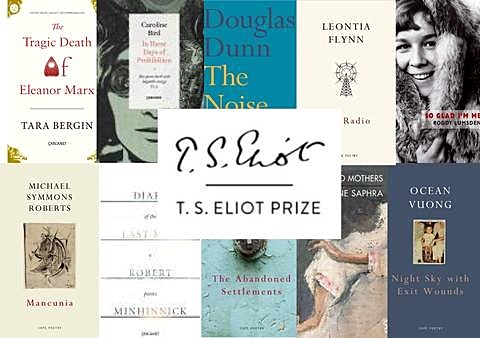
To mark the 25th anniversary of the T. S. Eliot Prize, the T. S. Eliot Foundation has increased the winner’s prize money to £25,000. Judges Bill Herbert (Chair), James Lasdun and Helen Mort have chosen the shortlist from a record 154 poetry collections submitted by publishers:
Tara Bergin – The Tragic Death of Eleanor Marx (Carcanet) PBS Autumn Recommendation
Caroline Bird – In these Days of Prohibition (Carcanet)
Douglas Dunn – The Noise of a Fly (Faber & Faber) PBS Autumn Recommendation
Leontia Flynn – The Radio (Cape Poetry)
Roddy Lumsden – So Glad I’m Me (Bloodaxe)
Michael Symmons Roberts – Mancunia (Cape Poetry) PBS Autumn Recommendation
Robert Minhinnick – Diary of the Last Man (Carcanet)
James Sheard – The Abandoned Settlements (Cape Poetry) PBS Spring Choice
Jacqueline Saphra – All My Mad Mothers (Nine Arches Press)
Ocean Vuong – Night Sky with Exit Wounds (Cape Poetry) PBS Summer Recommendation
Chair Bill Herbert said:
“This was a very strong year, and it was a privilege to read so many books that possessed as well as intrigued us; our shortlist explores grief, pleasure, place and history in a formidable variety of ways.”
The T. S. Eliot Prize is run by The T. S. Eliot Foundation. This is the richest prize in British poetry, with the winning poet receiving a cheque for £25,000 and the shortlisted poets each receiving £1,500.
The T. S. Eliot Prize Shortlist Readings will take place on Sunday 14th January 2018 in Southbank Centre’s Royal Festival Hall. The shortlist readings are the largest annual poetry event in the UK and will be hosted once again by Ian McMillan. Tickets are now on sale from Southbank Centre’s ticket office on 0203 879 9555 or via www.southbankcentre.co.uk/literature.
The winner of the 2017 Prize will be announced at the Award Ceremony on Monday 15th January 2018, where the winner and the shortlisted poets will be presented with their cheques. This continues the tradition started by Mrs Valerie Eliot, who provided the prize money from the inception of the Prize.
Last year’s winner was Jacob Polley for Jackself (Picador). The judges were Ruth Padel (Chair), Julia Copus and Alan Gillis.
fleursdumal.nl magazine
More in: Archive E-F, Awards & Prizes, Eliot, T. S., Literary Events, Ocean Vuong

Fet
De sterren
Haast sprakeloos stond ik te kijken,
Wel duizenden sterren zag ik, –
Ik had met die duizenden sterren
Een soort van verbinding, een klik.
Ik dacht… geen idee wat ik dacht toen,
Er klonk geheimzinnig gezang,
De sterren, zij twinkelden zachtjes,
De sterren waar ik naar verlang…
Afanasi Fet, Я долго стоял неподвижно,1843.
Vertaling Paul Bezembinder 2017.
Op dit gedicht bestaat een bekende, aan Ivan Toergenjev toegeschreven parodie; deze werd aangetroffen in zijn nagelaten archieven in Parijs.

Toergenjev
…
Haast sprakeloos stond ik te kijken,
Ik dacht haast dat ik er in bleef, –
Het waren maar vreemde gedichten,
Die verzen die Fet voor ons schreef.
Ik las… geen idee wat ik las toen,
Iets met geheimzinnig behang,
Het bundeltje viel uit mijn handen,
Het ligt hier nog steeds in de gang…
Ivan Toergenjev, Я долго стоял неподвижно, 1863?
Een parodie op een gelijknamig gedicht van Afanasi Fet.
Vertaling Paul Bezembinder, 2017
Afanasi Fet & Ivan Toergenjev: De sterren (vertaling van Paul Bezembinder)
Afanasi Afanasjevitsj Fet (Russisch: Афанасий Афанасьевич Фет, 1820 – 1892)
Ivan Sergejevitsj Toergenjev (Russisch: Ива́н Серге́евич Турге́нев, 1818 – 1883)
Paul Bezembinder studeerde theoretische natuurkunde in Nijmegen. In zijn poëzie zoekt hij in vooral klassieke versvormen en thema’s naar de balans tussen serieuze poëzie, pastiche en smartlap. Zijn gedichten (Nederlands) en vertalingen (Russisch-Nederlands) verschenen in verschillende (online) literaire tijdschriften. Voorbeelden van zijn werk zijn te vinden op zijn website, www.paulbezembinder.nl
fleursdumal.nl magazine
More in: Archive A-B, Archive E-F, Archive S-T, Bezembinder, Paul, Fet, Fet, Afanasi, Toergenjev, Toergenjev, Ivan
Wie Elsschot zegt, denkt niet meteen aan poëzie. Toch zijn het juist enkele van zijn dichtregels die iedereen zal herkennen: ‘tussen droom en daad staan wetten in de weg en praktische bezwaren’, bijvoorbeeld. Willem Elsschot. Dichter bevat alle gedichten uit Elsschots enige bundel.
 Een select gezelschap van vijfentwintig scherpzinnige lezers geeft er commentaar bij, aangevoerd door Elsschotkenner Koen Rymenants en poëzie-expert Carl de Strycker. Ze verhelderen Elsschots proza met behulp van zijn poëzie en omgekeerd. Ze tonen ons Elsschot als gelegenheidsdichter en -vertaler en brengen onvermoede verwantschappen aan het licht: met Guido Gezelle en de gezusters Loveling, de Bijbel en Victor Hugo, maar ook met Herman de Coninck en Kees van Kooten.
Een select gezelschap van vijfentwintig scherpzinnige lezers geeft er commentaar bij, aangevoerd door Elsschotkenner Koen Rymenants en poëzie-expert Carl de Strycker. Ze verhelderen Elsschots proza met behulp van zijn poëzie en omgekeerd. Ze tonen ons Elsschot als gelegenheidsdichter en -vertaler en brengen onvermoede verwantschappen aan het licht: met Guido Gezelle en de gezusters Loveling, de Bijbel en Victor Hugo, maar ook met Herman de Coninck en Kees van Kooten.
Koen Rymenants (1977) promoveerde op een proefschrift over Elsschot: Een hoopje vuil in de feestzaal. Facetten van het proza van Willem Elsschot (2009). Hij publiceert over literatuur en is bestuurslid van het Willem Elsschot Genootschap.
Carl de Strycker (1981) is directeur van Poëziecentrum en hoofdredacteur van Poëziekrant. Met Yra van Dijk en Maarten De Pourcq stelde hij het boek Draden in het donker. Intertekstualiteit in theorie en praktijk (2013) samen.
Willem Elsschot. Dichter
Koen Rymenants, Carl De Strycker
Paperback
ISBN 978-94-6310-290-2
€ 22,50
Paperback
Formaat 140 x 215
Aantal pagina’s 304
Publicatiedatum 5 okt. 2017
Uitg. Polis Antwerpen
fleursdumal.nl magazine
More in: - Book News, - Book Stories, Archive E-F, Archive E-F, Art & Literature News, Willem Elsschot
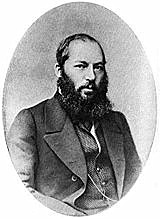
Afanasi Fet
(1820 – 1892)
Bij de haard
De kolen gloeien. Haast doorzichtig
Speelt in de haard het donker vuur.
Zo danst om rozen, heel omzichtig,
Van vlindervleugels het lazuur.
Een bontgekleurde reeks figuren
Trekt aan mijn moede oog voorbij,
Onnoembaar veel gezichten turen
Vanuit de grauwe as naar mij.
Dan ziet mijn ziel, al is het even,
Verdriet en vreugde in de gloed,
En liegt zij dat zij best kan leven
Met alles wat zij missen moet.
Afanasi Fet, У камина, 1856
Vertaling Paul Bezembinder, 2017
Paul Bezembinder: zijn gedichten en vertalingen verschenen in verschillende (online) literaire tijdschriften. Zie meer op zijn website: www.paulbezembinder.nl
fleursdumal.nl magazine
More in: Archive E-F, Fet, Fet, Afanasi

Afanasi Fet
(1820 – 1892)
Kolkende storm . . .
Kolkende storm in de luchtzee,
Kokend van woede het sop;
Kolkende zee van gedachten,
Kokend van woede mijn kop;
Kolkende zee van gedachten,
Stortvloed van drift in de kop;
Donkere wolken op wolken,
Kokend van woede het sop.
Afanasi Fet, Буря на небе вечерный, 1842
Vertaling Paul Bezembinder 2016
Paul Bezembinder studeerde theoretische natuurkunde in Nijmegen. In zijn poëzie zoekt hij in vooral klassieke versvormen en thema’s naar de balans tussen serieuze poëzie, pastiche en smartlap. Zijn gedichten (Nederlands) en vertalingen (Russisch-Nederlands) verschenen in verschillende (online) literaire tijdschriften. Voorbeelden van zijn werk zijn te vinden op zijn website: www.paulbezembinder.nl
fleursdumal.nl magazine
More in: Archive E-F, Fet, Fet, Afanasi

F. Scott Fitzgerald
Rain before dawn
The dull, faint patter in the drooping hours
Drifts in upon my sleep and fills my hair
With damp; the burden of the heavy air
Is strewn upon me where my tired soul cowers,
Shrinking like some lone queen in empty towers
Dying. Blind with unrest I grow aware:
The pounding of broad wings drifts down the stair
And sates me like the heavy scent of flowers.
I lie upon my heart. My eyes like hands
Grip at the soggy pillow. Now the dawn
Tears from her wetted breast the splattered blouse
Of night; lead-eyed and moist she straggles o’er the lawn,
Between the curtains brooding stares and stands
Like some drenched swimmer — Death’s within the house!
F. Scott Fitzgerald (1896 – 1940)
Poem: Rain before dawn
fleursdumal.nl magazine
More in: Archive E-F, F. Scott Fitzgerald, Fitzgerald, F. Scott

Anne Finch
To A Husband
This is to the crown and blessing of my life,
The much loved husband of a happy wife;
To him whose constant passion found the art
To win a stubborn and ungrateful heart,
And to the world by tenderest proof discovers
They err, who say that husbands can’t be lovers.
With such return of passion, as is due,
Daphnis I love, Daphinis my thoughts pursue;
Daphnis, my hopes and joys are bounded all in you.
Even I, for Daphnis’ and my promise’ sake,
What I in woman censure, undertake.
But this from love, not vanity proceeds;
You know who writes, and I who ’tis that reads.
Judge not my passion by my want of skill:
Many love well, though they express it ill;
And I your censure could with pleasure bear,
Would you but soon return, and speak it here.
Anne Finch (1661 – 1720)
To A Husband
fleursdumal.nl magazine
More in: Archive E-F, CLASSIC POETRY

Anne Finch
Adam Posed
Could our first father, at his toilsome plow,
Thorns in his path, and labor on his brow,
Clothed only in a rude, unpolished skin,
Could he a vain fantastic nymph have seen,
In all her airs, in all her antic graces,
Her various fashions, and more various faces;
How had it posed that skill, which late assigned
Just appellations to each several kind!
A right idea of the sight to frame;
T’have guessed from what new element she came;
T’have hit the wav’ring form, or giv’n this thing a name.
Anne Finch (1661 – 1720)
Adam Posed
fleursdumal.nl magazine
More in: Archive E-F, CLASSIC POETRY
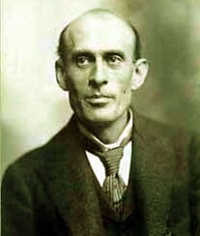
Eugene Field
(1850–1895)
Be my sweetheart
Sweetheart, be my sweetheart
When birds are on the wing,
When bee and bud and babbling flood
Bespeak the birth of spring,
Come, sweetheart, be my sweetheart
And wear this posy-ring!
Sweetheart, be my sweetheart
In the mellow golden glow
Of earth aflush with the gracious blush
Which the ripening fields foreshow;
Dear sweetheart, be my sweetheart,
As into the noon we go!
Sweetheart, be my sweetheart
When falls the bounteous year,
When fruit and wine of tree and vine
Give us their harvest cheer;
Oh, sweetheart, be my sweetheart,
For winter it draweth near.
Sweetheart, be my sweetheart
When the year is white and old,
When the fire of youth is spent, forsooth,
And the hand of age is cold;
Yet, sweetheart, be my sweetheart
Till the year of our love be told!
Eugene Field poetry
fleursdumal.nl magazine
More in: Archive E-F, Archive E-F, Field, Eugene

Eugene Field
(1850–1895)
A drinking song
Come, brothers, share the fellowship
We celebrate to-night;
There’s grace of song on every lip
And every heart is light!
But first, before our mentor chimes
The hour of jubilee,
Let’s drink a health to good old times,
And good times yet to be!
Clink, clink, clink!
Merrily let us drink!
There’s store of wealth
And more of health
In every glass, we think.
Clink, clink, clink!
To fellowship we drink!
And from the bowl
No genial soul
In such an hour can shrink.
And you, oh, friends from west and east
And other foreign parts,
Come share the rapture of our feast,
The love of loyal hearts;
And in the wassail that suspends
All matters burthensome,
We’ll drink a health to good old friends
And good friends yet to come.
Clink, clink, clink!
To fellowship we drink!
And from the bowl
No genial soul
In such an hour will shrink.
Clink, clink, clink!
Merrily let us drink!
There’s fellowship
In every sip
Of friendship’s brew, we think.
Eugene Field poetry
fleursdumal.nl magazine
More in: Archive E-F, Archive E-F, Field, Eugene
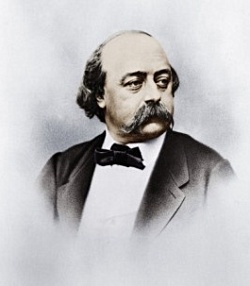
Gustave Flaubert
(1821 – 1880)
La Mort d’Emma
Éperdu, balbutiant, près de tomber,
Charles tournait dans la chambre.
Il se heurtait aux meubles, s’arrachait les cheveux, et jamais le pharmacien n’avait cru qu’il pût y avoir de si épouvantable spectacle…
Puis, revenu près d’elle, il s’affaissa par terre sur le tapis, et il restait la tête appuyée contre le bord de sa couche à sangloter.
—
Ne pleure pas ! lui dit-elle.
Bientôt je ne te tourmenterai plus !
—
Pourquoi ?
Qui t’a forcée ?
Elle répliqua : —
Il le fallait, mon ami. —
N’étais-tu pas heureuse ?
Est-ce ma faute ?
J’ai fait tout ce que j’ai pu pourtant !
—
Oui…, c’est vrai…, tu es bon, toi !
Et elle lui passait la main dans les cheveux, lentement.
La douceur de cette sensation surchargeait sa tristesse ; il sentait tout son être s’écrouler de désespoir à l’idée qu’il fallait la perdre, quand, au contraire, elle avouait pour lui plus d’amour que jamais ; et il ne pouvait rien ; il ne savait pas, il n’osait, l’urgence d’une résolution immédiate achevait de le bouleverser.
Elle en avait fini, songeait-elle, avec toutes les trahisons, les bassesses et les innombrables convoitises qui la torturaient.
Elle ne haïssait personne, maintenant ; une confusion de crépuscule s’abattait en sa pensée, et de tous les bruits de la terre, Emma n’entendait plus que l’intermittente lamentation de ce pauvre cœur, douce et indistincte, comme le dernier écho d’une symphonie qui s’éloigne.
Gustave Flaubert poésie
fleursdumal.nl magazine
More in: Archive E-F, Archive E-F, Gustave Flaubert
Thank you for reading Fleurs du Mal - magazine for art & literature